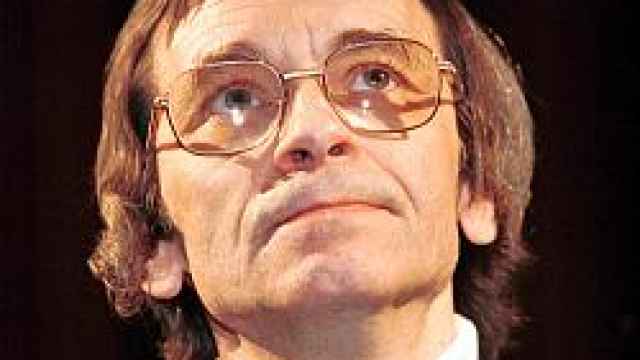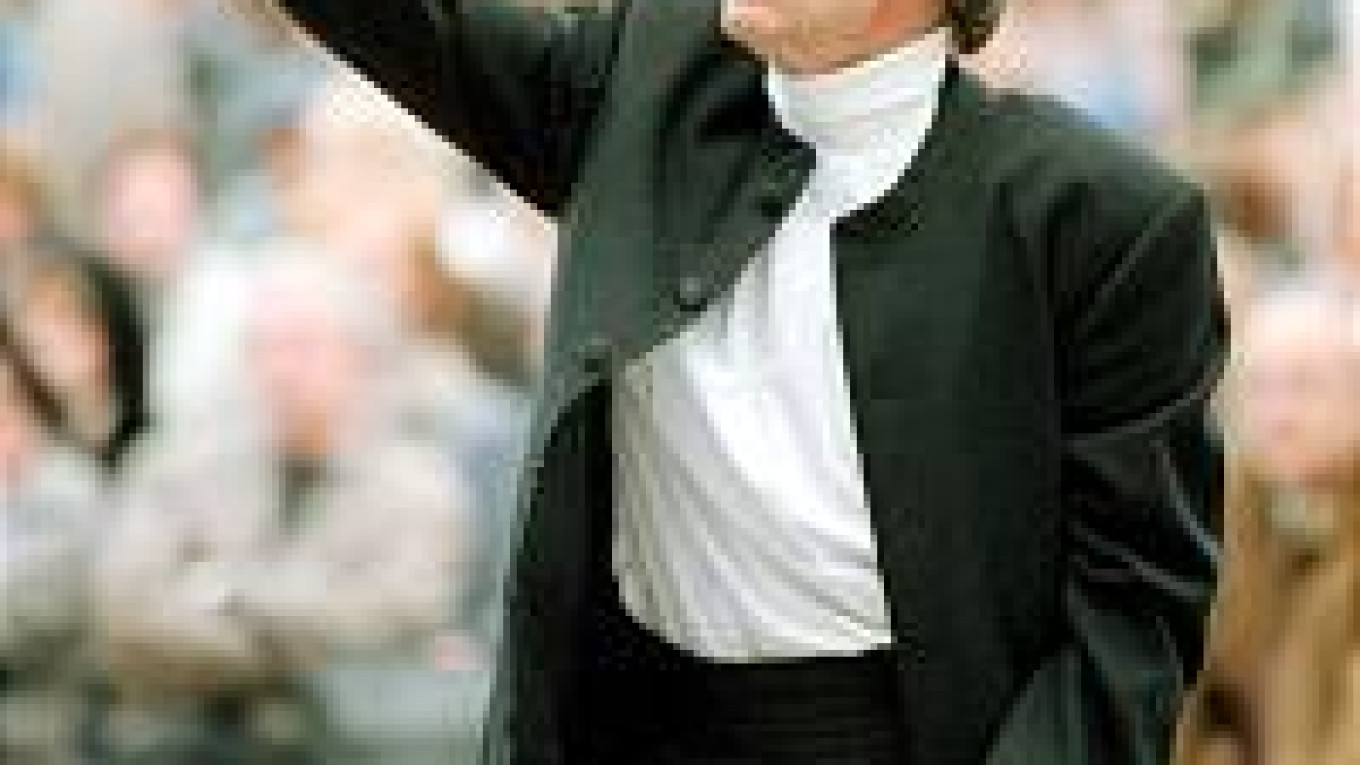Kolobov performed for the last time in Novgorod on June 7. He conducted the Novaya Opera's orchestra in a production of Pyotr Tchaikovsky's "Eugene Onegin." The opera was among the most popular shows in the Novaya Opera's repertoire.
Music critic Svyatoslav Belza said this week that Kolobov's death was "a colossal loss for Russian musical arts because he was an outstanding conductor and a true innovator in his field," Itar-Tass reported.
Kolobov had a reputation for modernizing classic works and devising innovations such as seating members of the orchestra in the theater's rafters or performing traditional operas without scenery.
Born in 1946 in Leningrad, Kolobov graduated from that city's Academy of Choral Arts in 1963, going on from there to study at the Sverdlovsk Conservatory of Music, where he trained with conductor Mark Paverman. Under Paverman's tutelage, Kolobov earned a degree in conducting and choral arts in 1968. Two years later, he found himself working with Paverman again in the school's operatic and symphonic department, from which he graduated in 1974 with specialties in choral, operatic and symphonic conducting.
Immediately upon graduation, Kolobov found work conducting at the Sverdlovsk Theater of Opera and Ballet, and, at age 31, was promoted to head conductor. At the time, his critics charged that he was too young for the job, but Kolobov responded by invoking the history of the legendary Arturo Toscanini, who was made head conductor of La Scala at the same age. Comparisons could also be made to Gustav Mahler, who had appeared in nearly all the great European theaters before he had reached his 30th birthday. But while Mahler had a theater of his own at 37 -- the Vienna State Opera, where he was to remain for the next decade -- Kolobov did not achieve that goal until he was 45.
Nevertheless, Kolobov continued to progress in his career. Named a Merited Artist of Russia at 33, Kolobov four years later became a conductor at the venerable Mariinsky Theater, where he conducted operas by Giuseppe Verdi and Nikolai Rimsky-Korsakov and ballets by Tchaikovsky and Adolphe Adam. In 1987, he turned down the opportunity to assume Yury Temirkanov's place as head conductor at the Mariinsky, only to take over at Moscow's Stanislavsky and Nemirovich-Danchenko Musical Theater one year later. Kolobov's renditions of Vincenzo Bellini's "Il Pirata," Modest Mussorgsky's "Boris Godunov" and Sergei Prokofiev's "Romeo and Juliet" were immensely popular with audiences and deemed smashing successes, solidifying his place among the country's top conductors.
But Kolobov's unconventional methods weren't for everyone, and by 1991 the Stanislavsky and Nemirovich-Danchenko was split between Kolobov's supporters and his opponents (unfortunately this was typical for Moscow theaters in those years -- the Taganka Theater and MKhAT suffered the same difficulties). When Moscow's then Deputy Mayor Yury Luzhkov offered Kolobov the opportunity to open his own theater, some 200 staff members of the Stanislavsky and Nemirovich-Danchenko theater left with him. For three years, the new collective, the Novaya Opera, operated without a stage of its own, often travelling abroad to perform. After a stay in a remodeled movie theater near Taganskaya Ploshchad, the company was finally given its own building -- the current Novaya Opera Theater, in the Hermitage Gardens -- just in time for Moscow's 850th birthday celebration.
During the 1990s, Kolobov received both the Triumph and Golden Mask awards, as well a prize for work in the arts from the Moscow city government. He toured the world with the Novaya Opera's symphony orchestra, but said he preferred to travel within Russia, focusing his tours on cities that had no opera theaters or symphony orchestras of their own.
 ITAR-TASS One of the country's foremost operatic conductors, Yevgeny Kolobov, who died Sunday at 57, founded the Novaya Opera in 1991. | |
Kolobov was one of the most controversial figures of the Russian musical scene. His approach to the classic operatic scores evoked diametrically opposite reactions in his critics and audiences, ranging from displeasure to elation. Many were irritated, too, by his loud assertions of his own "messianism" (yet another parallel with Mahler).
Reproached for his headstrong readings of Verdi or Tchaikovsky, Kolobov liked to say, "In the next world, I will explain to Tchaikovsky why I skipped those five measures. Maybe he'll understand."
The maestro was decidedly conservative in his choice of repertoire; sticking almost exclusively to operas from the 19th century, he practically ignored the operatic legacy of Mozart.
"I believe the best music has already been composed," the conductor once said.
Often in interviews, Kolobov talked about death: "Sometimes I wish for it," he said, "when I fall short of the results I was aiming for."
No announcement has yet been made as to who will replace the conductor at the Novaya Opera Theater.
A Message from The Moscow Times:
Dear readers,
We are facing unprecedented challenges. Russia's Prosecutor General's Office has designated The Moscow Times as an "undesirable" organization, criminalizing our work and putting our staff at risk of prosecution. This follows our earlier unjust labeling as a "foreign agent."
These actions are direct attempts to silence independent journalism in Russia. The authorities claim our work "discredits the decisions of the Russian leadership." We see things differently: we strive to provide accurate, unbiased reporting on Russia.
We, the journalists of The Moscow Times, refuse to be silenced. But to continue our work, we need your help.
Your support, no matter how small, makes a world of difference. If you can, please support us monthly starting from just $2. It's quick to set up, and every contribution makes a significant impact.
By supporting The Moscow Times, you're defending open, independent journalism in the face of repression. Thank you for standing with us.
Remind me later.


